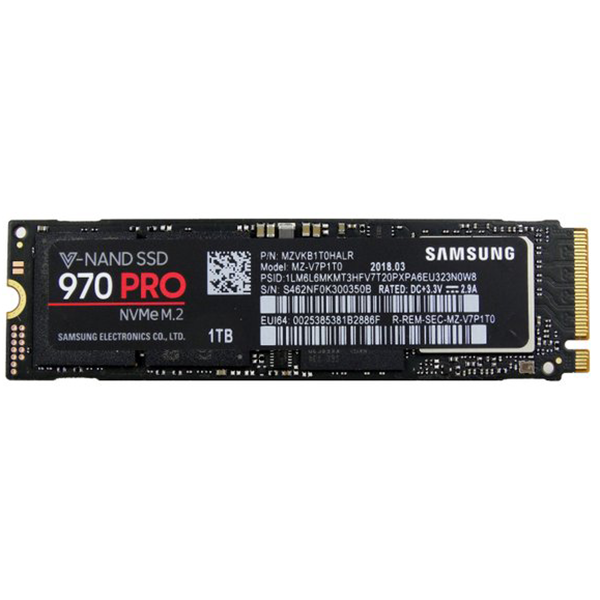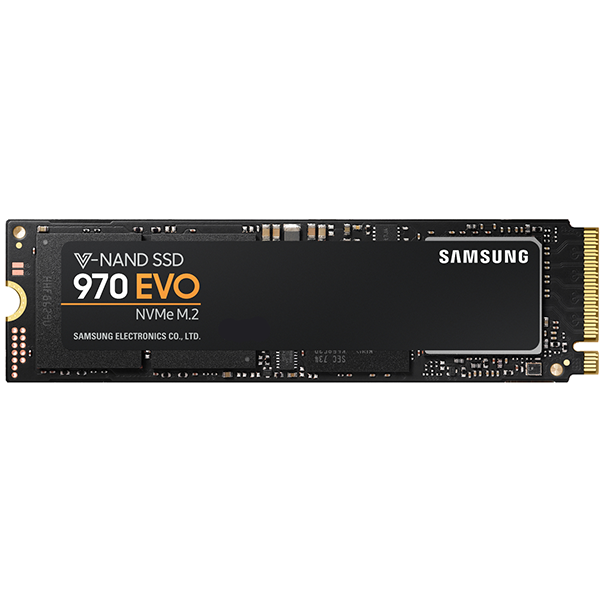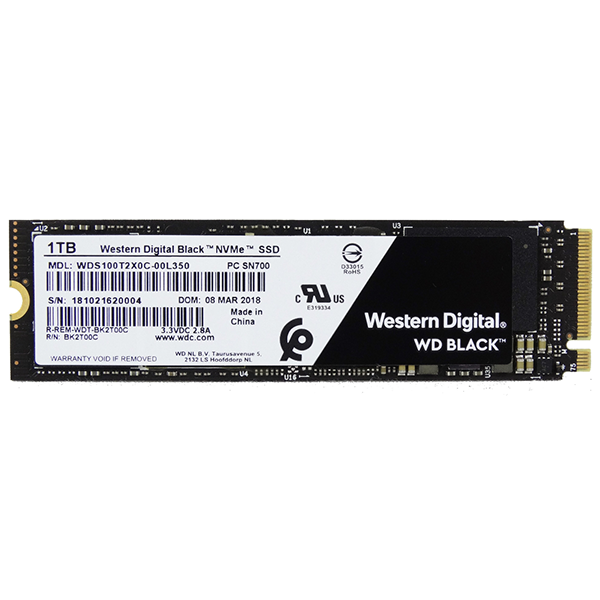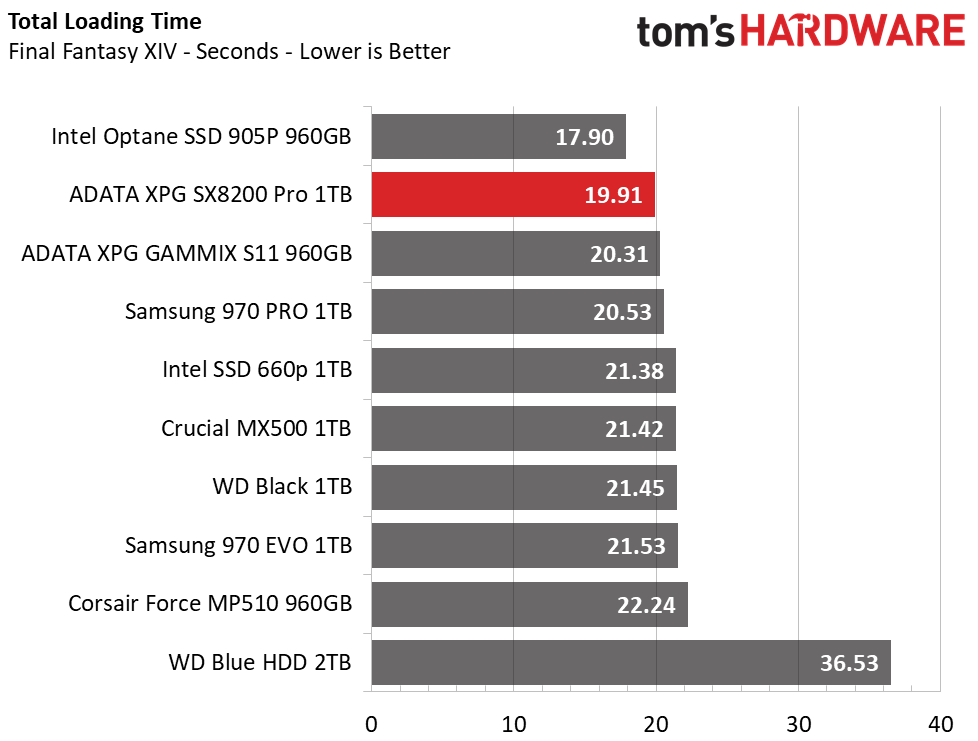Adata XPG SX8200 Pro Review: Go Pro on a Budget (2TB Update)
Why you can trust Tom's Hardware
Adata XPG SX8200 Pro (1TB)
Pros:
- Class-leading performance
- Class-leading power efficiency
- Black PCB w/ stylish DIY heat spreader
- Software package included
Cons:
- Same endurance as the non-Pro model
Verdict: The Adata XPG SX8200 Pro comes to market as a high-performance alternative to the Samsung 970 series and boasts best-in-class power efficiency. The SX8200 Pro delivers some of the best performance we’ve seen, comes with very respectable endurance, and has a price that won’t break the bank.
Comparison Products
Today, we pit the 1TB Adata SX8200 Pro against some of the best performing SSDs on the market. We’ve included the Samsung 970 Pro, Samsung 970 EVO, WD Black, Adata XPG GAMMIX S11, Intel SSD 660p, and Corsair Force MP510. All of these SSDs feature unique controllers and design characteristics which will help us gauge how well the new SM2262EN controller performs. We also included a Crucial MX500, a SATA drive, to show just how much of a difference there is between SATA and NVMe SSDs.
Trace Testing – PCMark 8 Storage Test 2.0
PCMark 8 is a trace-based benchmark that uses Microsoft Office, Adobe Creative Suite, World of Warcraft, and Battlefield 3 to measure the performance of storage devices in real-world scenarios.
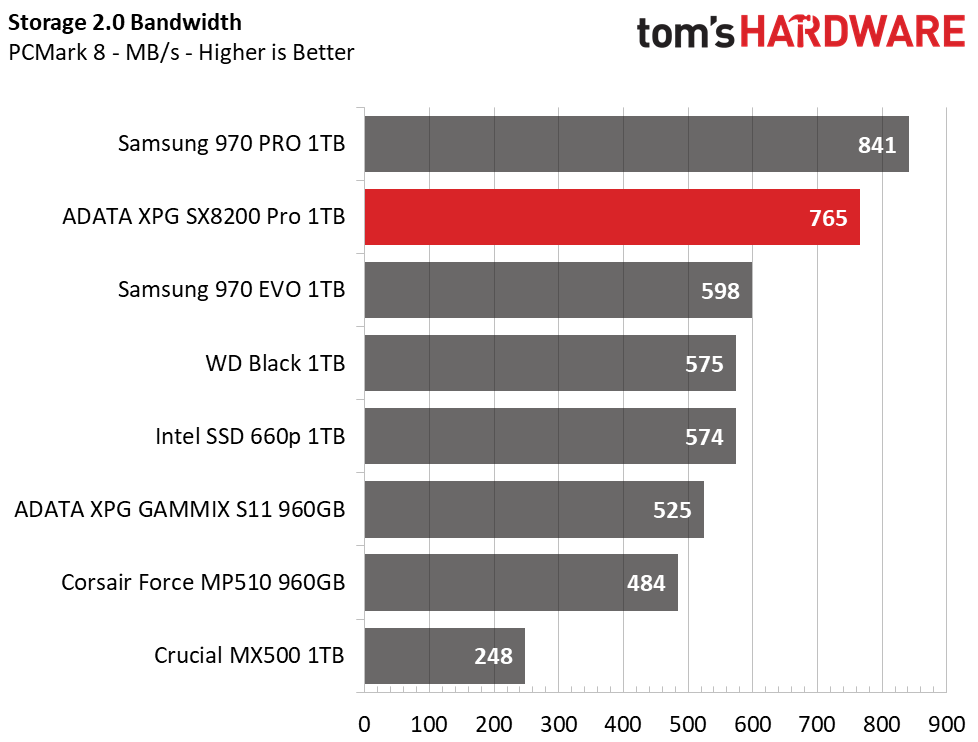
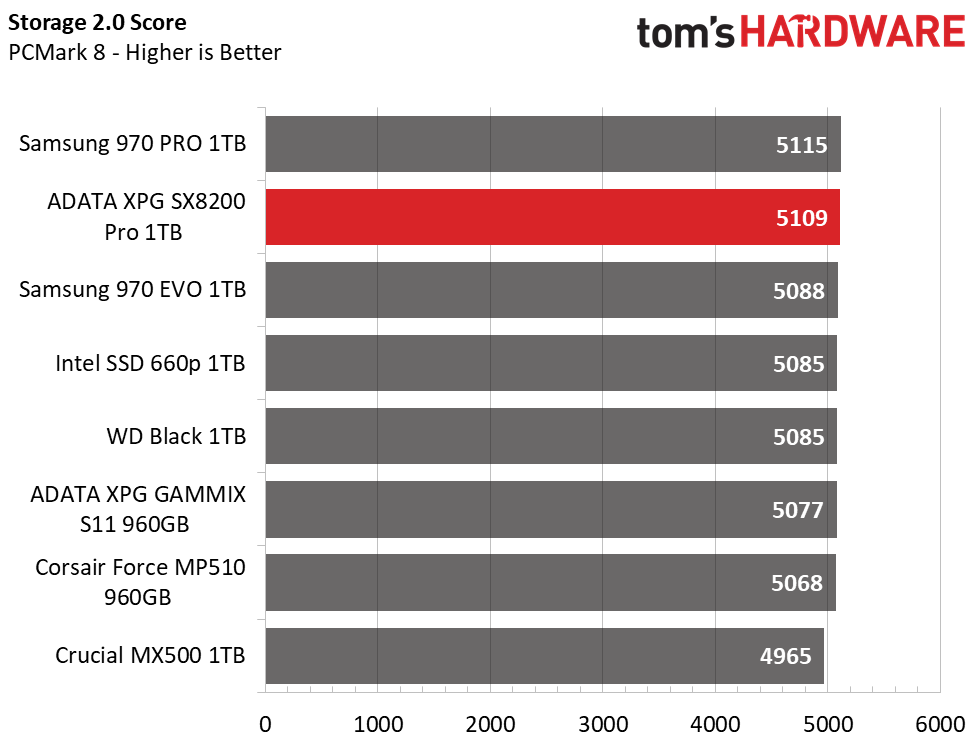
The SX8200 Pro ranks second to the Samsung 970 PRO. With an average bandwidth of 765MB/s, the new controller absolutely flies past the Adata GAMMIX S11 that features the vanilla SM2262 controller and the same NAND. This is the type of performance improvement we like to see.
Game Scene Loading - Final Fantasy XIV
The Final Fantasy XIV StormBlood benchmark is a free real-world game benchmark that easily and accurately compares game load times without the inaccuracy of using a stopwatch.
Get Tom's Hardware's best news and in-depth reviews, straight to your inbox.
Ranking second only to an Optane-powered SSD, Adata’s XPG SX8200 Pro loaded the level in just under 20 seconds. That is over 16 seconds faster than an HDD and faster than any other NAND-based SSD we have tested yet.
Transfer Rates – DiskBench
We use the DiskBench storage benchmarking tool to test file transfer performance with our own custom 50GB block of data. Our data set includes 31,227 files of various types, like pictures, PDFs, and videos. We copy the files to a new folder and then follow up with a read test of a newly-written 6 GB file.
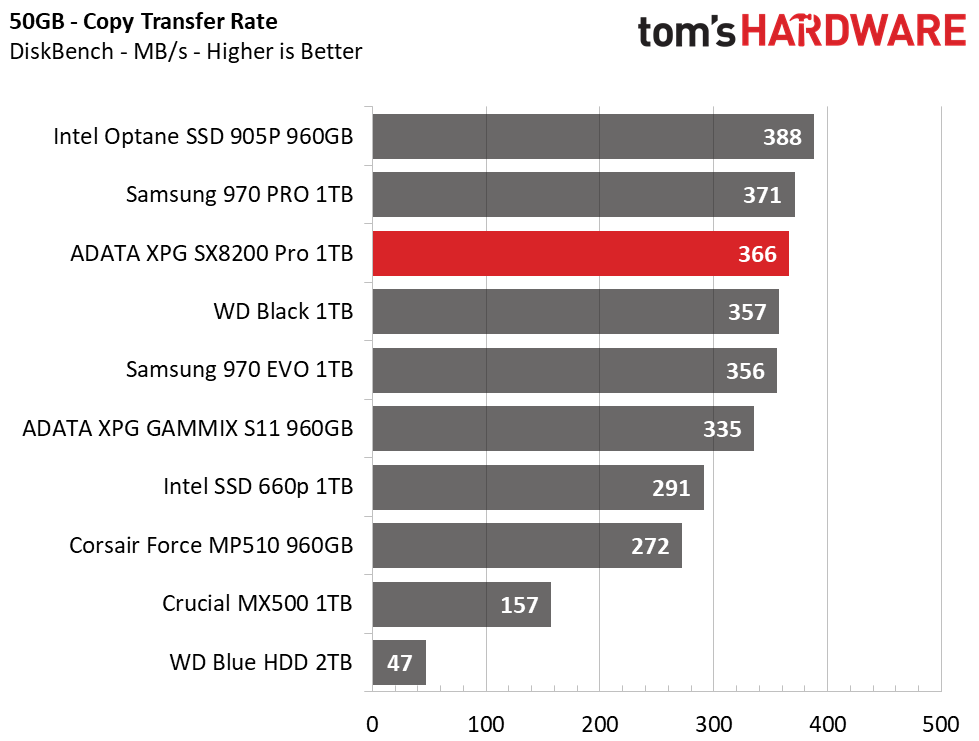
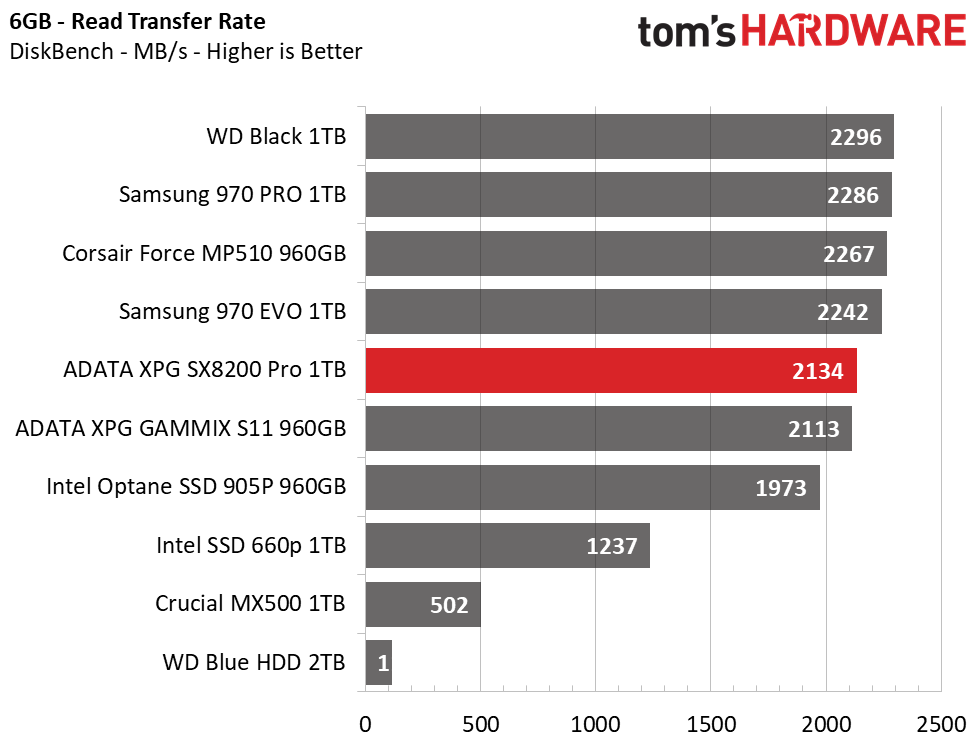
The SX8200 Pro’s file copy result beats the GAMMIX S11, Samsung EVO, and WD Black, though the Samsung 970 Pro slides past. The drive delivers just over 2.1GB/s during the read portion of the test and lands in the middle of the pack.
SYSmark 2014 SE
Like PCMark, SYSmark uses real applications to measure system performance. SYSmark takes things much further, however. It utilizes fourteen different applications to run real workloads with real data sets to measure how overall system performance impacts the user experience. BAPCo's SYSmark 2014 SE installs a full suite of applications for its tests, which includes Microsoft Office, Google Chrome, Corel WinZip, several Adobe software applications, and GIMP. That also makes it a great test to measure the amount of time it takes to install widely-used programs after you install a fresh operating system.
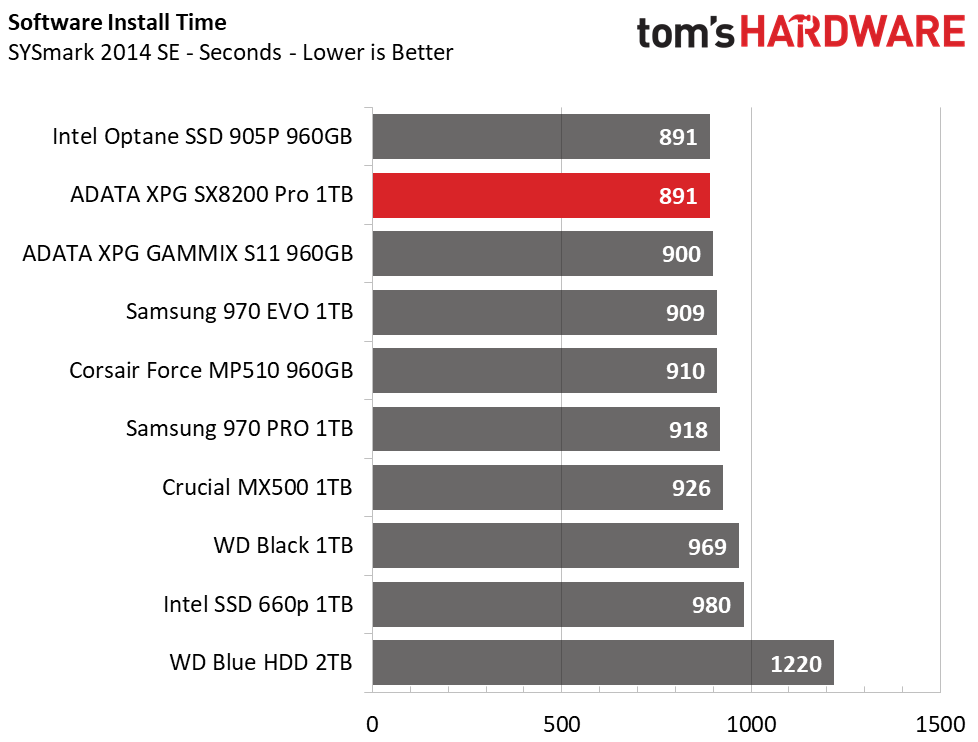
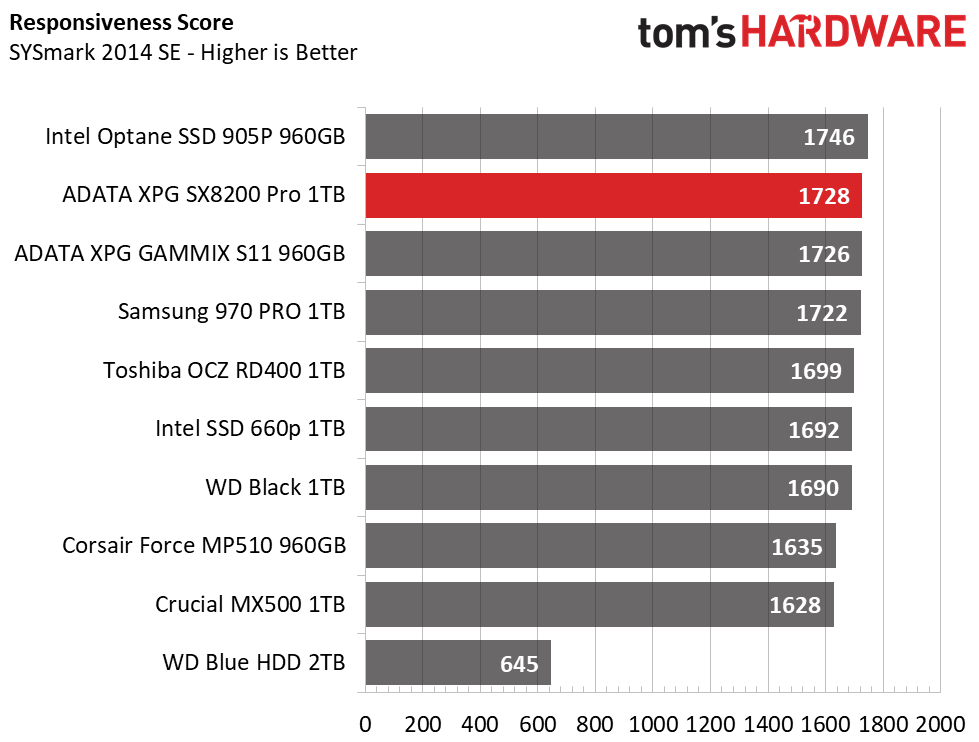
ADATAs’ XPG SX8200 Pro is absolutely smokin’. It installed SYSmark in the same time as the Intel Optane 905P, which is a first for a flash-based SSD. The SX8200 Pro also scored 1728 points in the responsiveness test, ranking as the most responsive flash-based SSD we've tested.
ATTO
ATTO is a simple and free application that SSD vendors commonly use to assign sequential performance specifications to their products. It also gives us insight into how the device handles different file sizes.
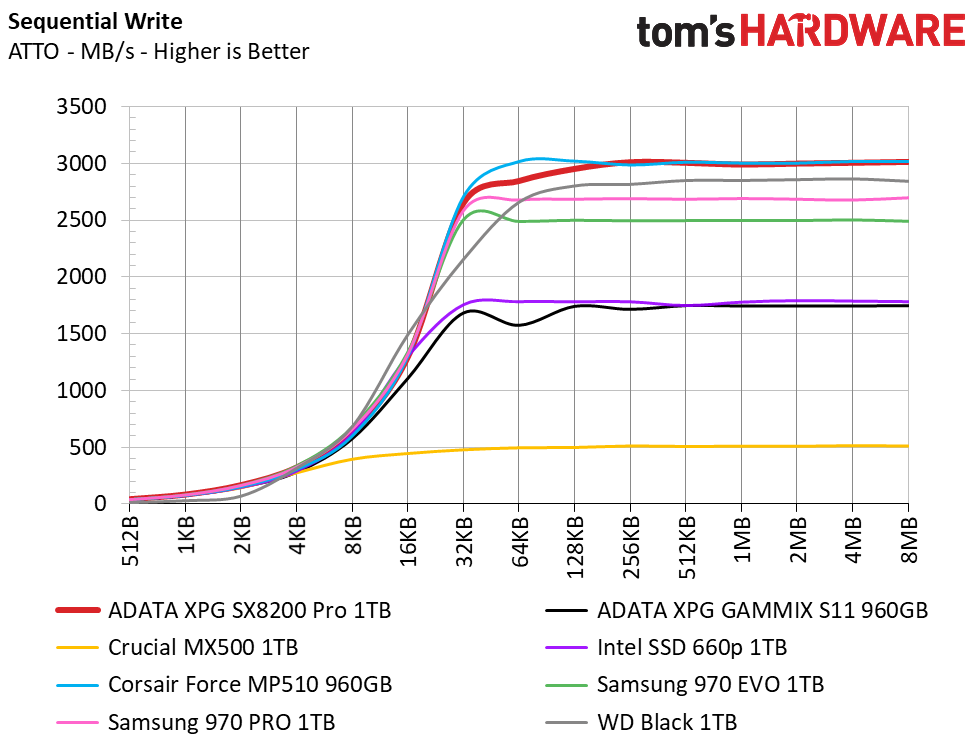
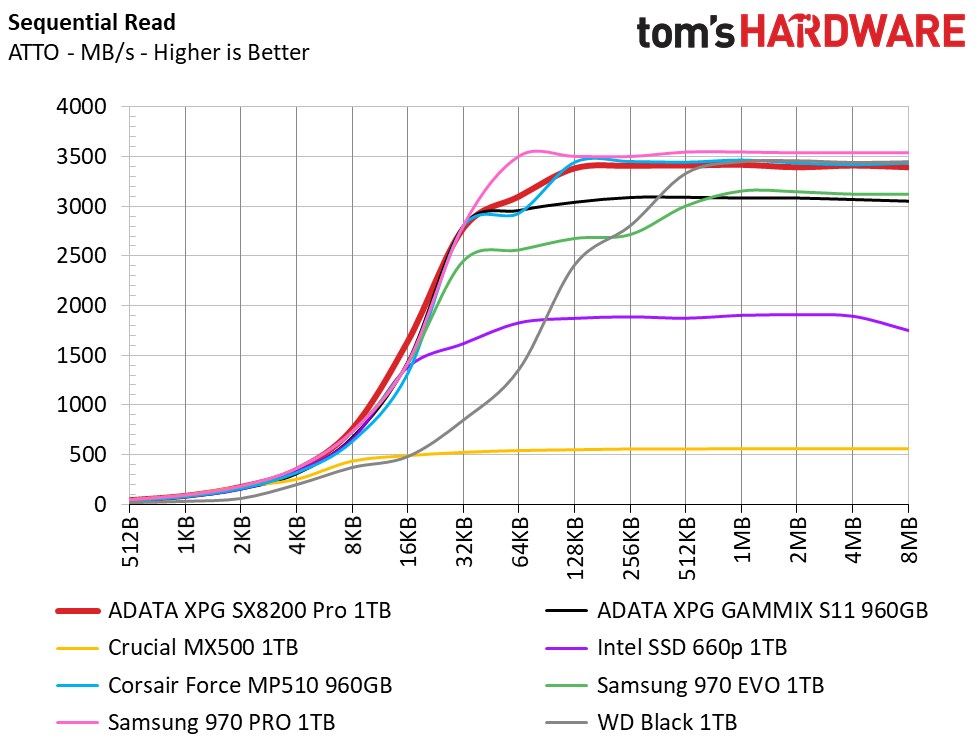
The SX8200 Pro’s performance is very similar to the Phison E12 powered Corsair Force MP510 during both sequential read and write workloads. Overall, it achieves just over 3.4/3.0GB/s of read/write throughput, which is over six times the performance you would see out of a SATA SSD.
Anvil's Storage Utilities
Anvil's Storage Utility is a commonly-referenced benchmark that simplifies the complex IOMETER benchmark and its underlying Dynamo engine with a one-click software wrapper.
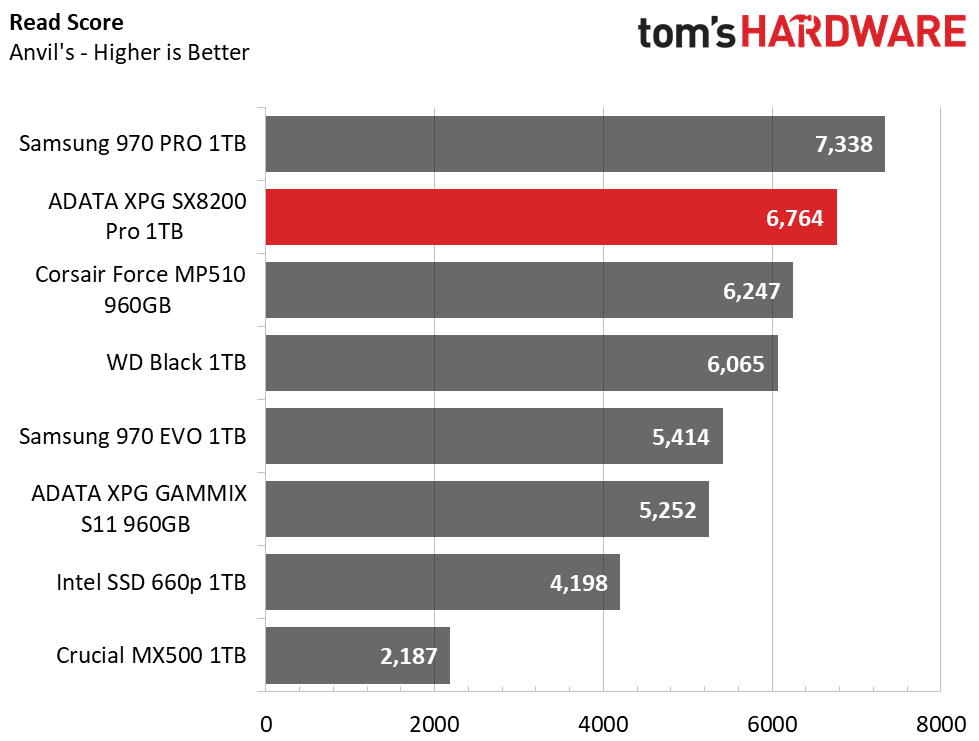
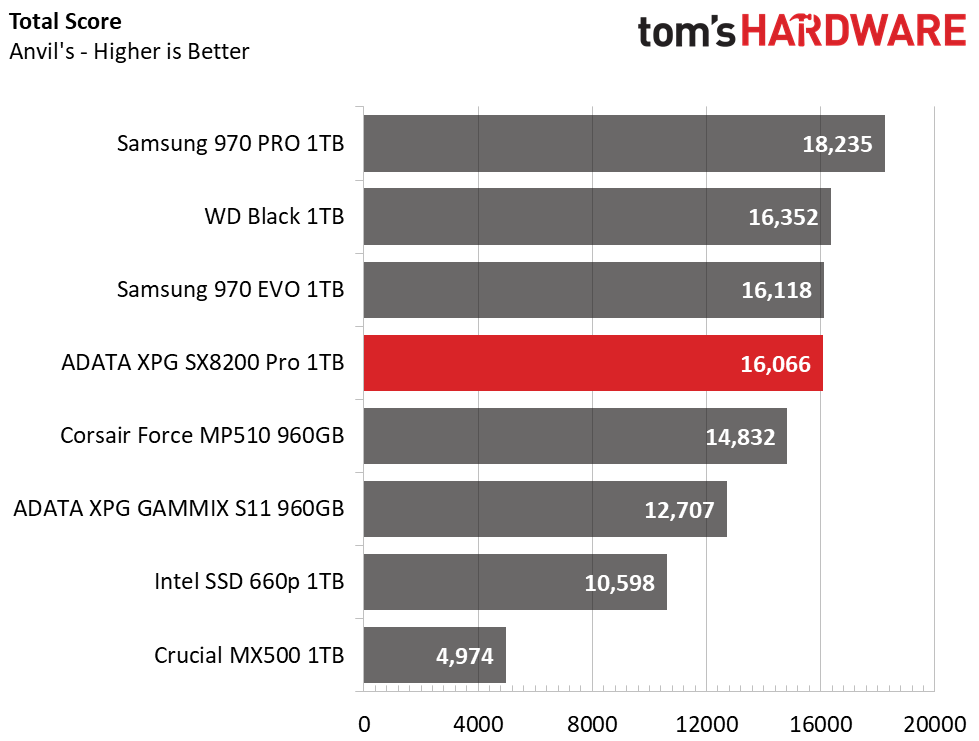
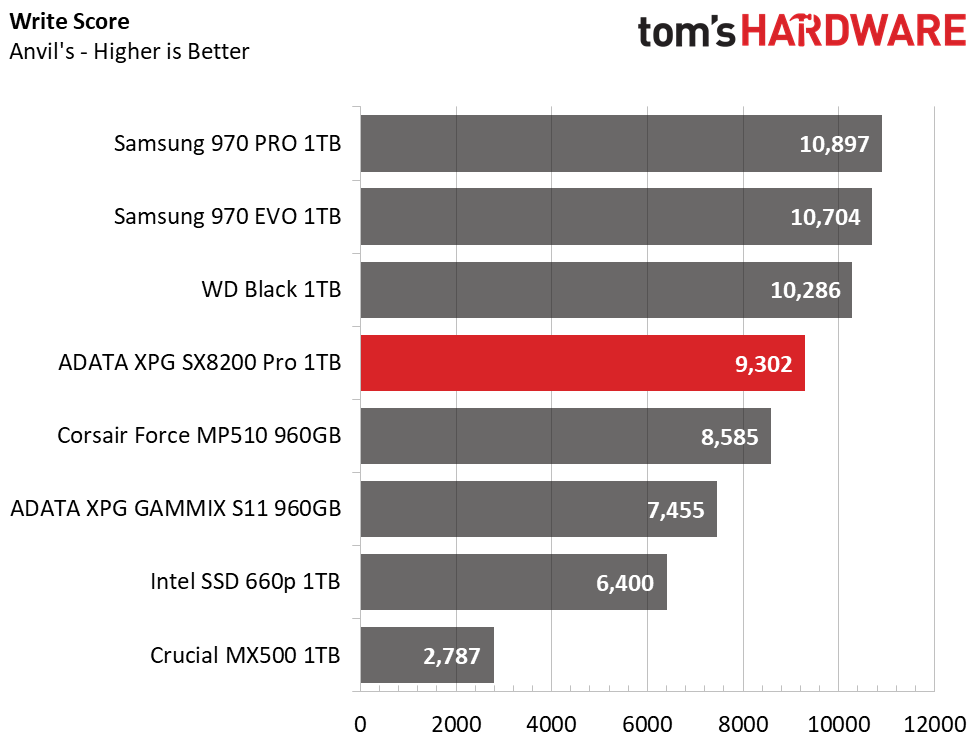
Anvil’s Storage Utilities scores help rank the performance of a storage device during multiple synthetic workloads. In this case, the Adata XPG SX8200 Pro ranks fourth overall, but it reaches second place in the separate read score. The WD Black and Samsung SSDs both barely outperform the SX8200 Pro's write performance at higher queue depths, thus helping boost their overall scores. What really matters to most consumers is low QD performance, however, which is where the SX8200 Pro shines.
CrystalDiskMark
CrystalDiskMark (CDM) is a simple and easy to use file size benchmarking tool.
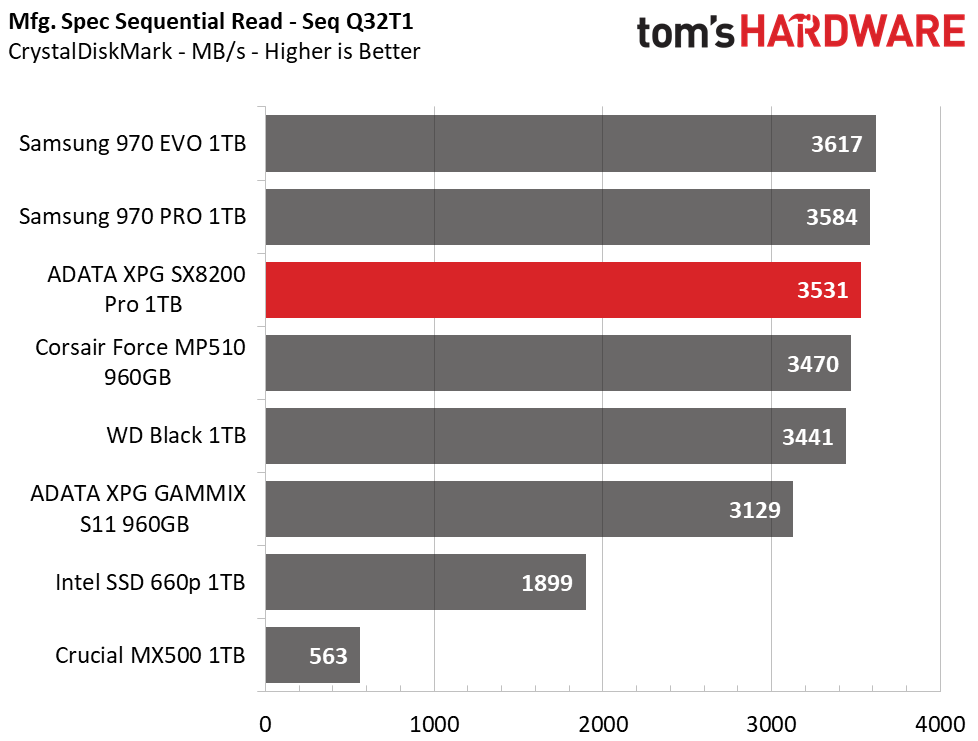
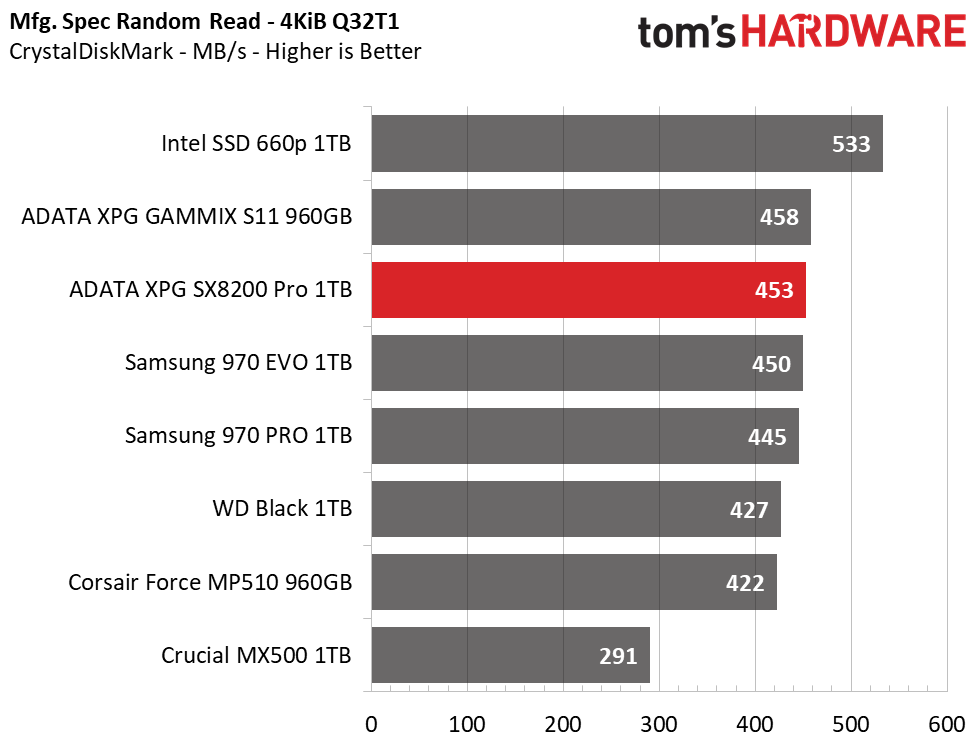
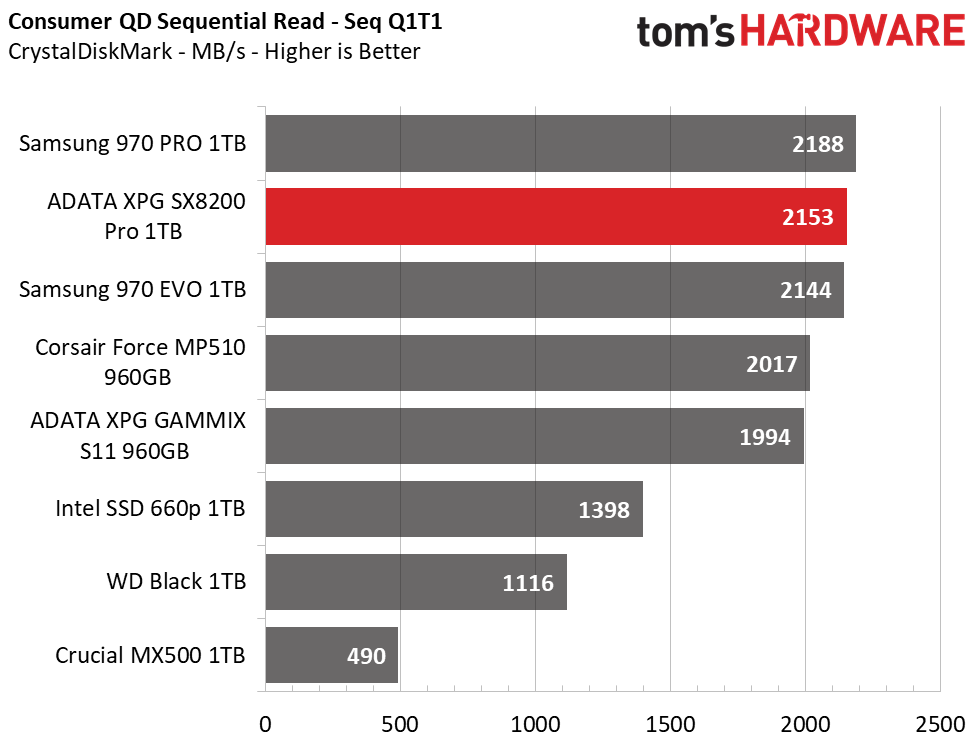
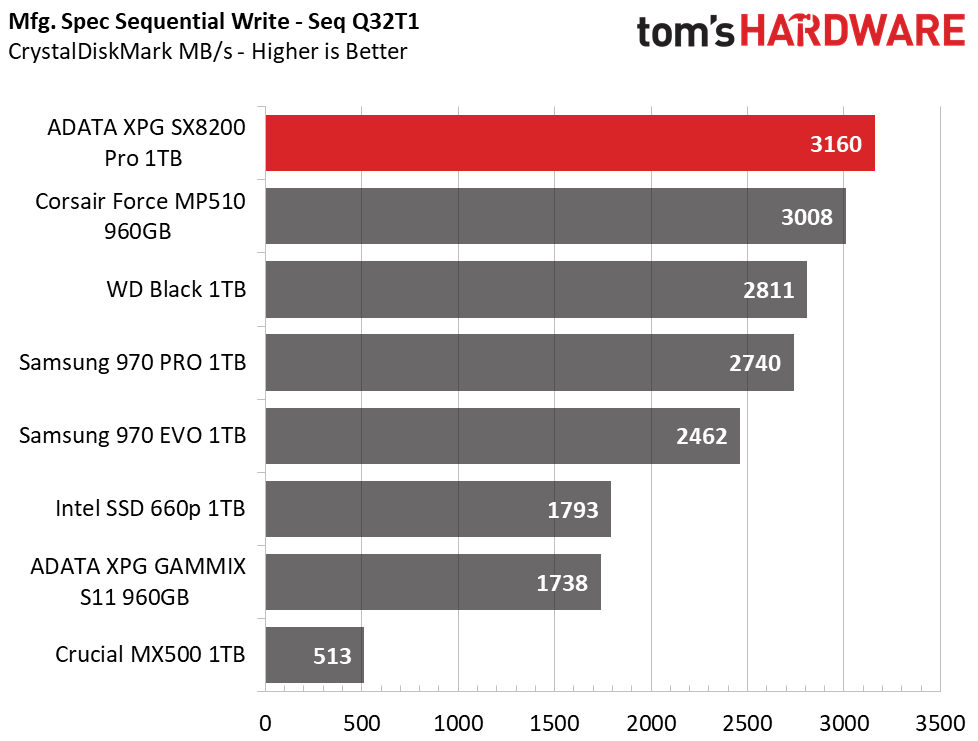
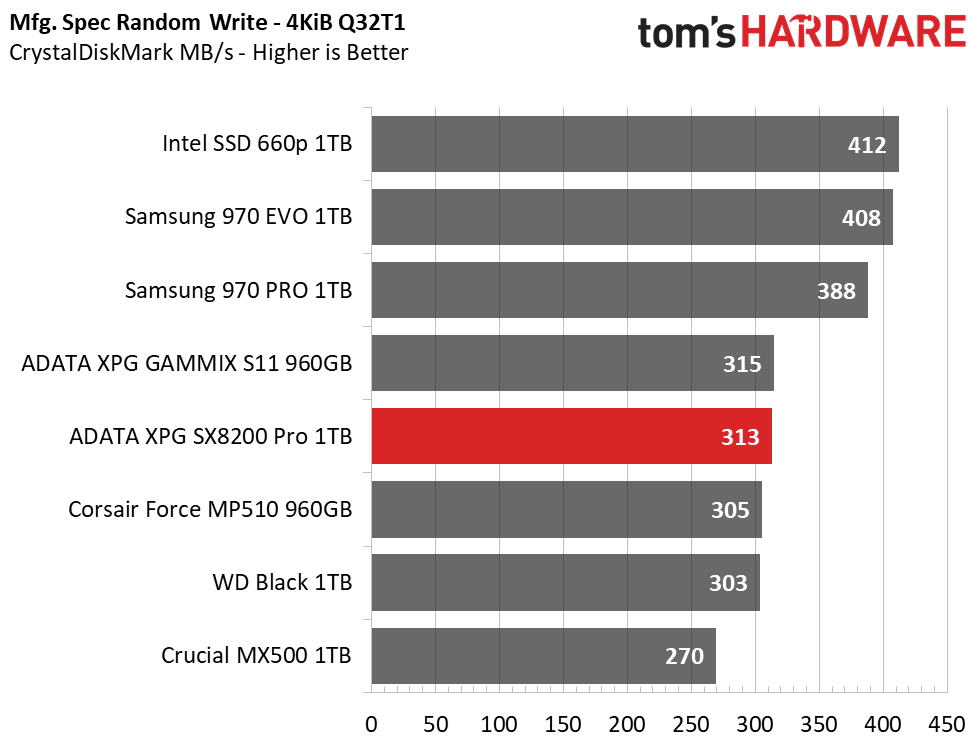
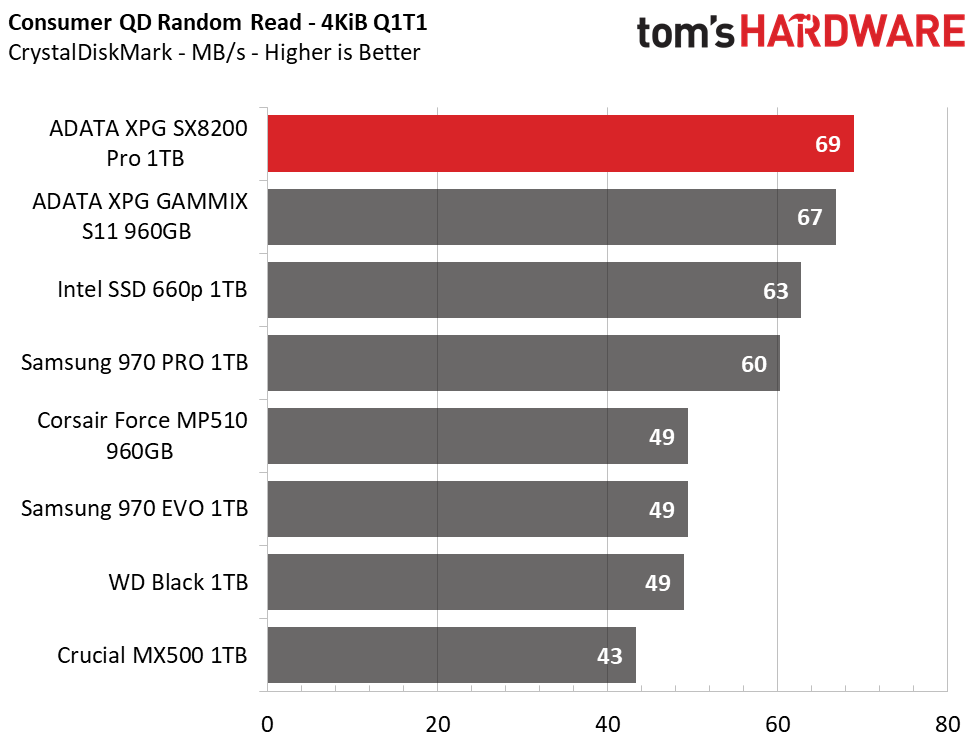
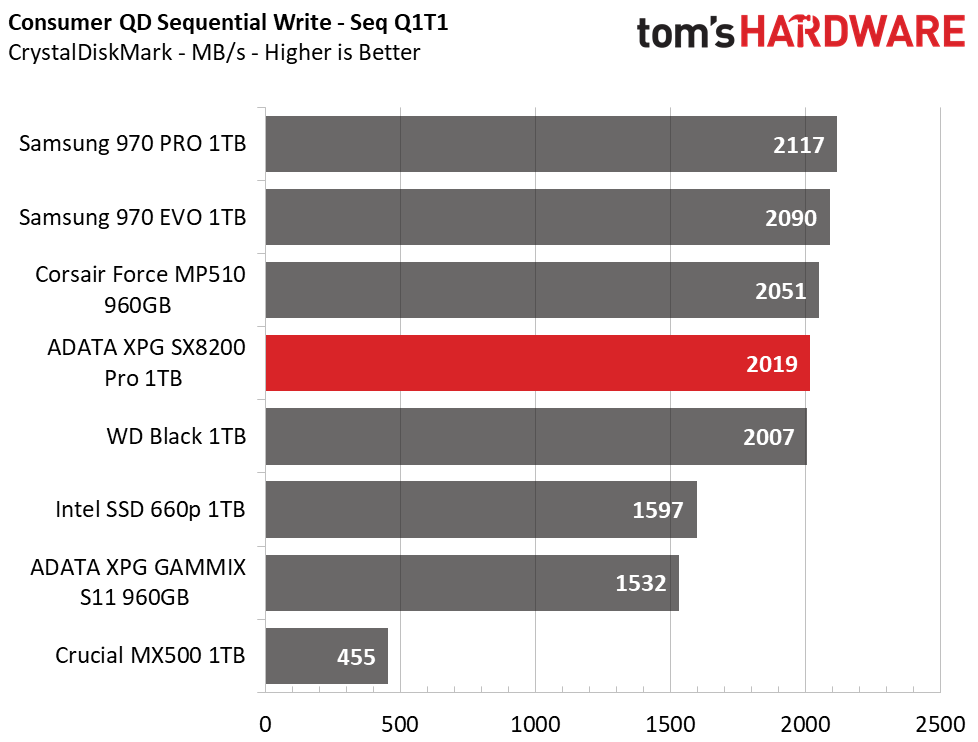
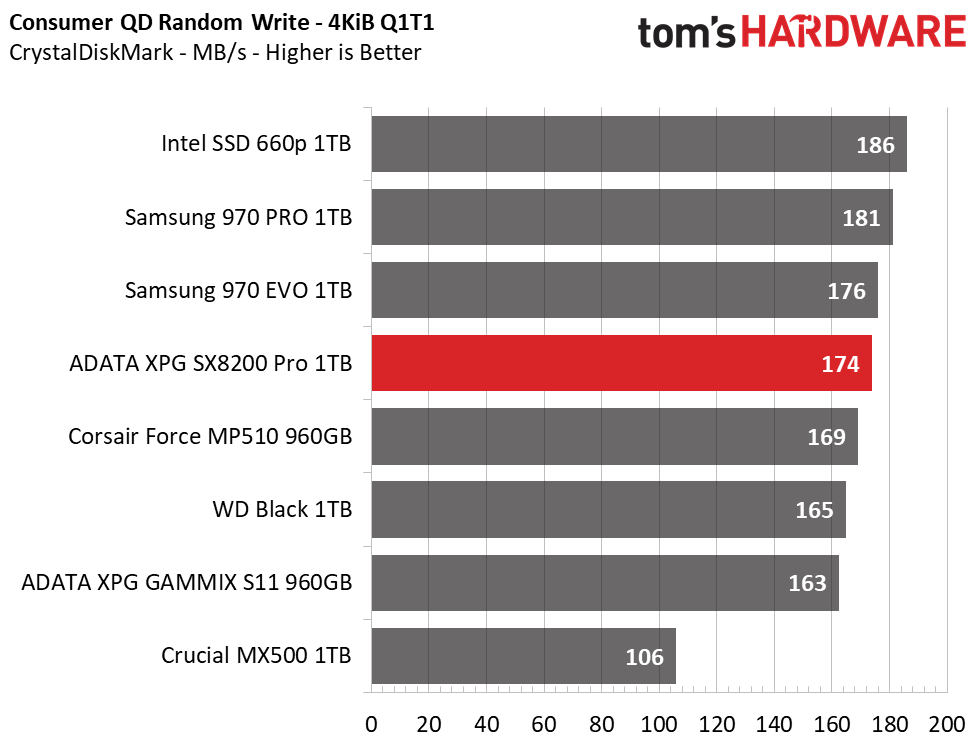
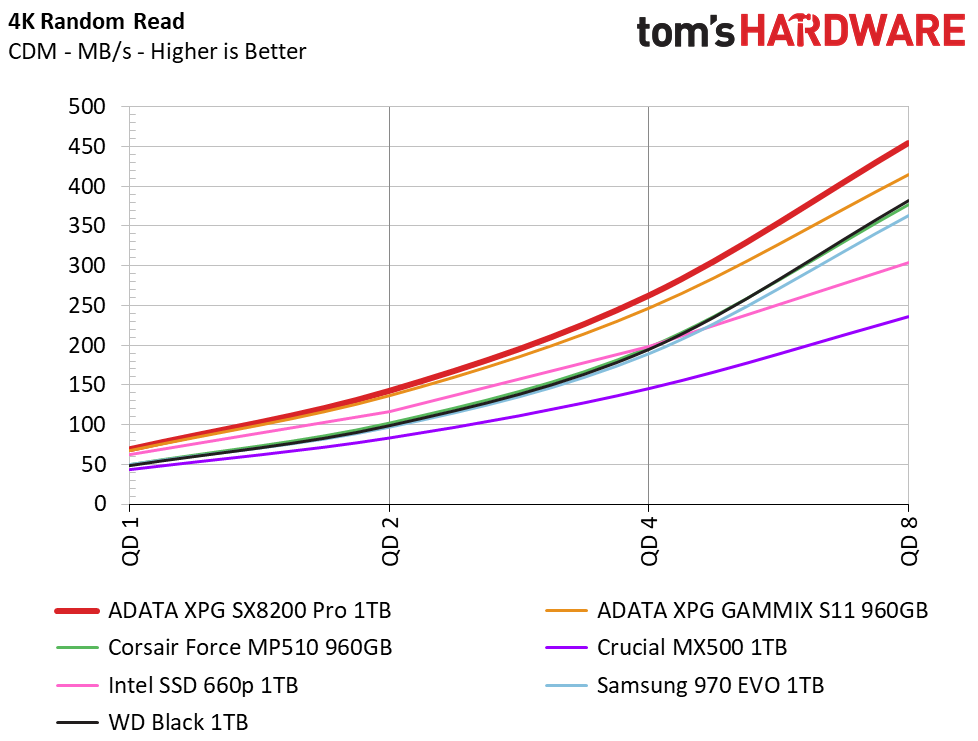
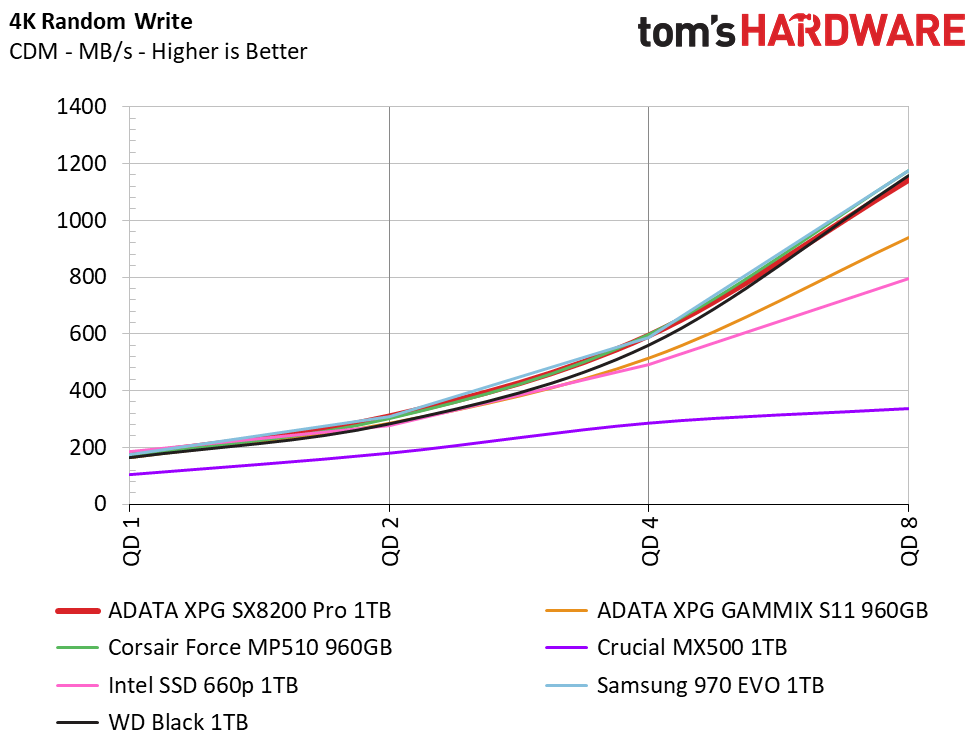
The SX8200 Pro ranks third in sequential read speed and first in write speed at QD32. At QD1, which matters more to consumers because it has a direct impact on snappiness, the drive ranks second in sequential read and fourth in sequential write performance. The SX8200 Pro tops the charts during a 4K read workload and lands in fourth place during the 4K random write test. The drive also tops the rest of the comparison pool from QD (queue depth) 2 to 8.
Sustained Sequential Write Performance
Official write specifications are only part of the performance picture. Most SSD makers implement an SLC cache buffer, which is a fast area of SLC-programmed flash that absorbs incoming data. Sustained write speeds can suffer tremendously once the workload spills outside of the SLC cache and into the "native" TLC or QLC flash. We hammer the SSDs with sequential writes for 15 minutes to measure both the size of the SLC buffer and performance after the buffer is saturated.
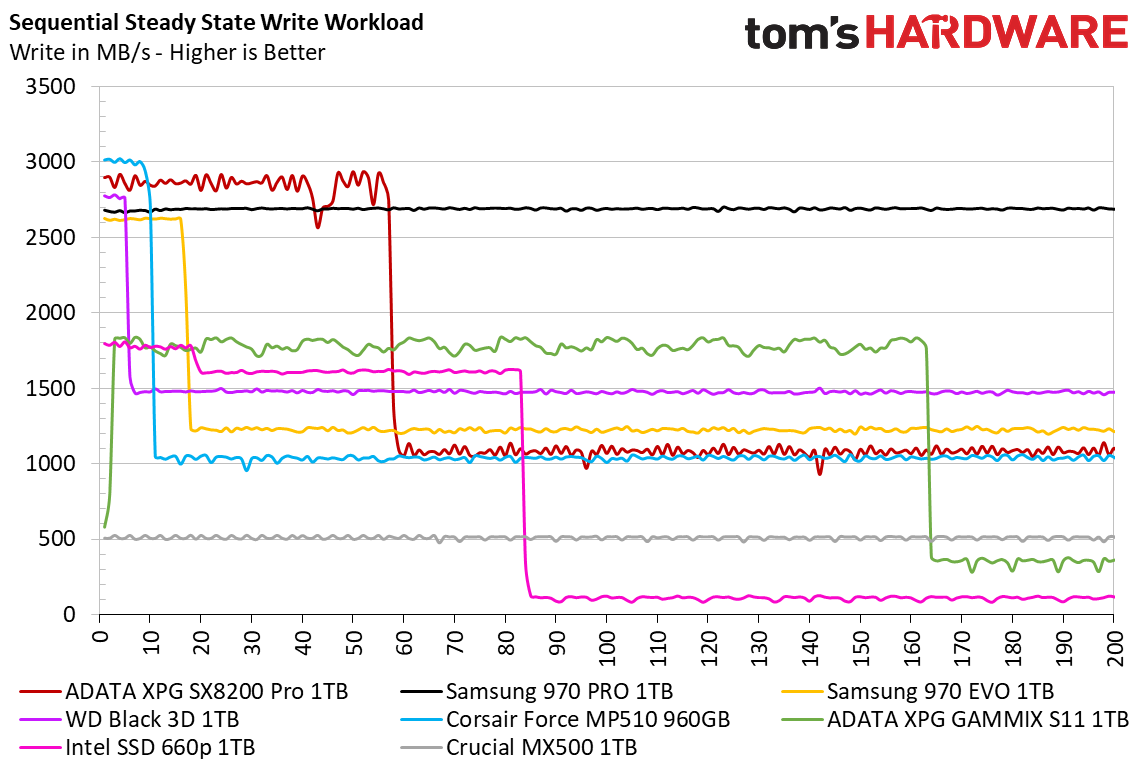
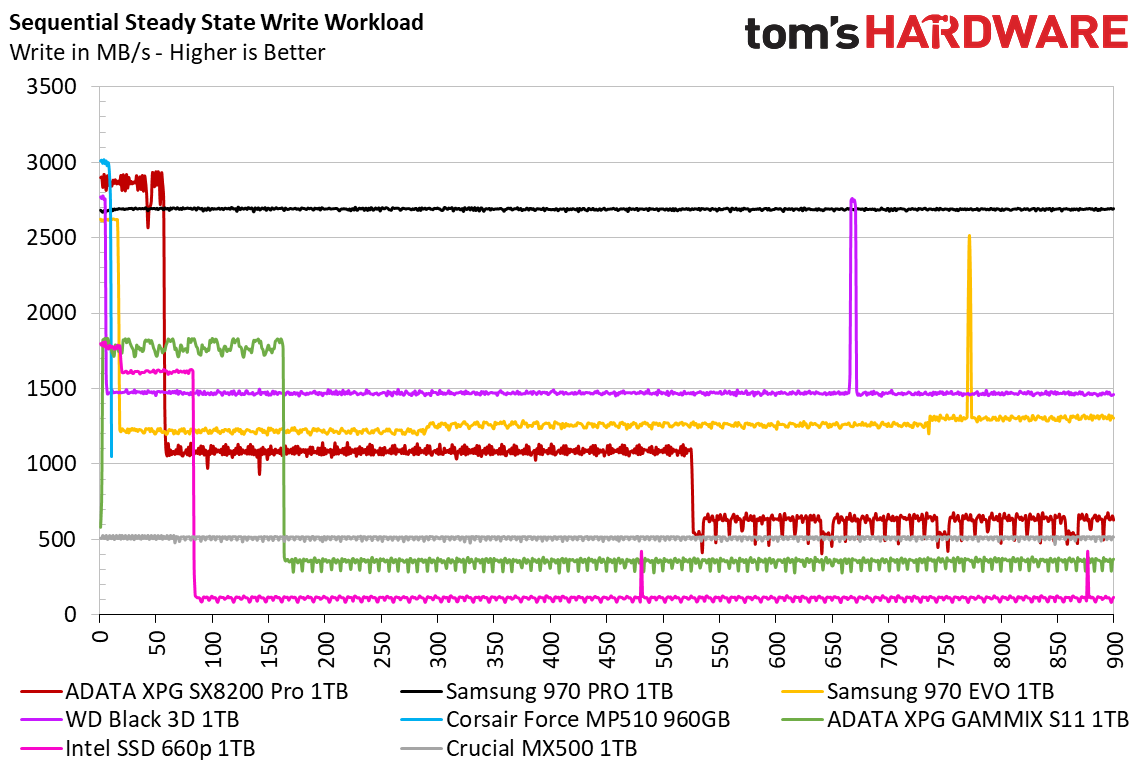
It seems that the Adata XPG SX8200 Pro features a two-tiered write cache. During the first minute of the test, the drive wrote over 165GB of data at an average rate of 2.85GB/s. Then performance degraded to an average of 1.1GB/s over the next 7-8 minutes while the drive wrote an additional 500GB of data. After that, it degraded once more to an average of 615MB/s. So, for those of you who write lots of large files, the SX8200 Pro should be able to handle the workload without much issue.
Power Consumption
We use the Quarch HD Programmable Power Module to gain a deeper understanding of power characteristics. Idle power consumption is a very important aspect to consider, especially if you're looking for a new drive for your laptop. Some SSDs can consume watts of power at idle while better-suited ones sip just milliwatts. Average workload power consumption and max consumption are two other aspects of power consumption, but performance-per-watt is more important. A drive might consume more power during any given workload, but accomplishing a task faster allows the drive to drop into an idle state faster, which ultimately saves power.
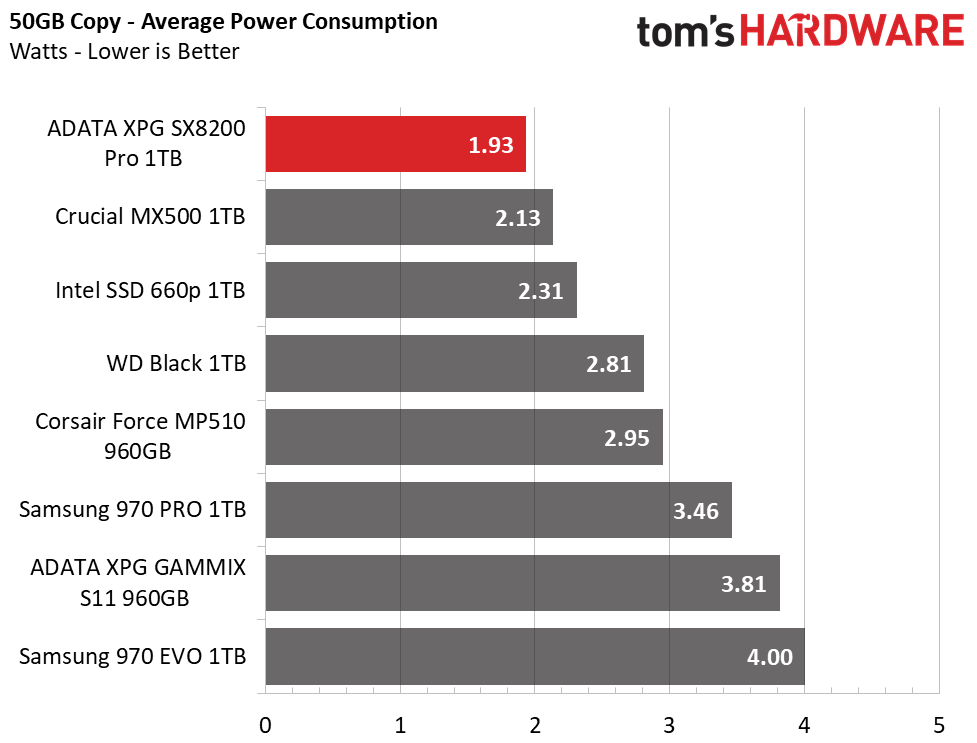
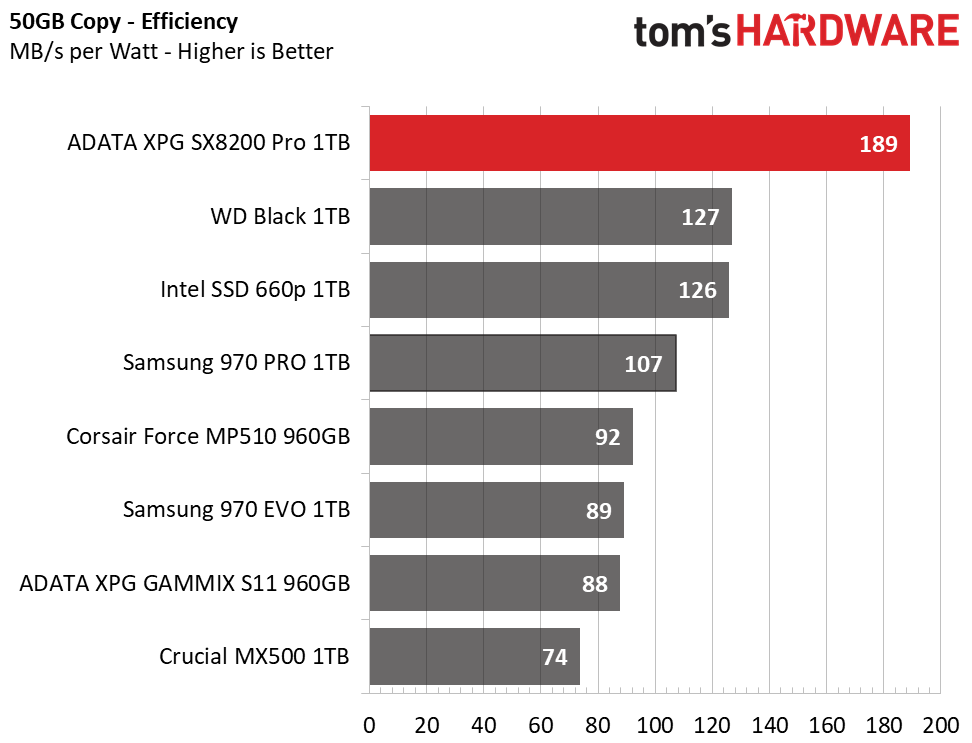
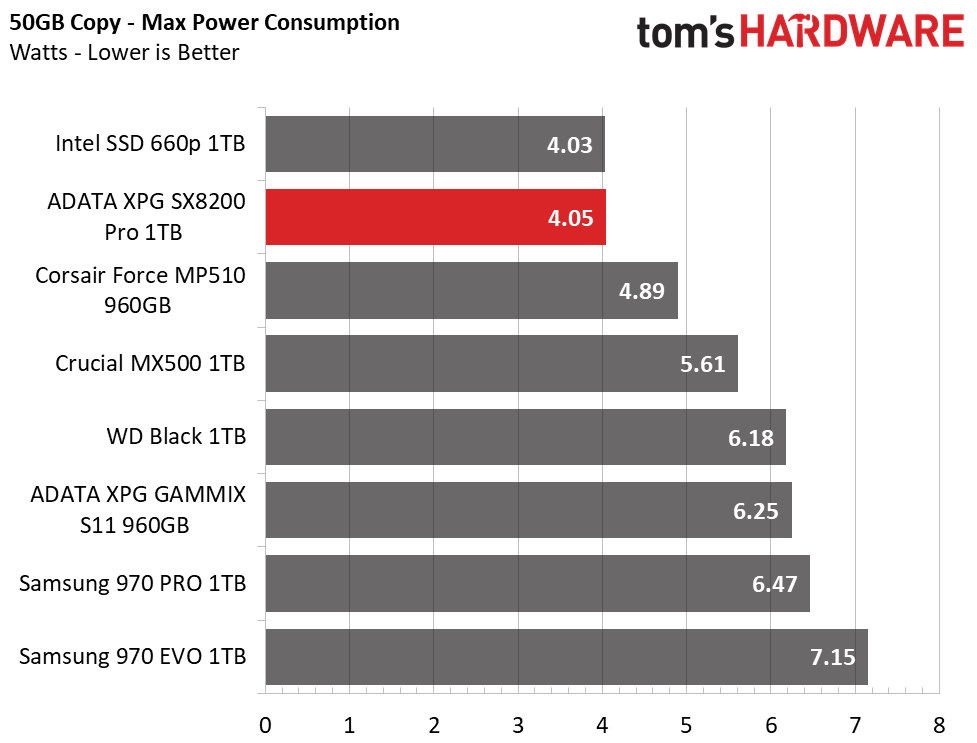
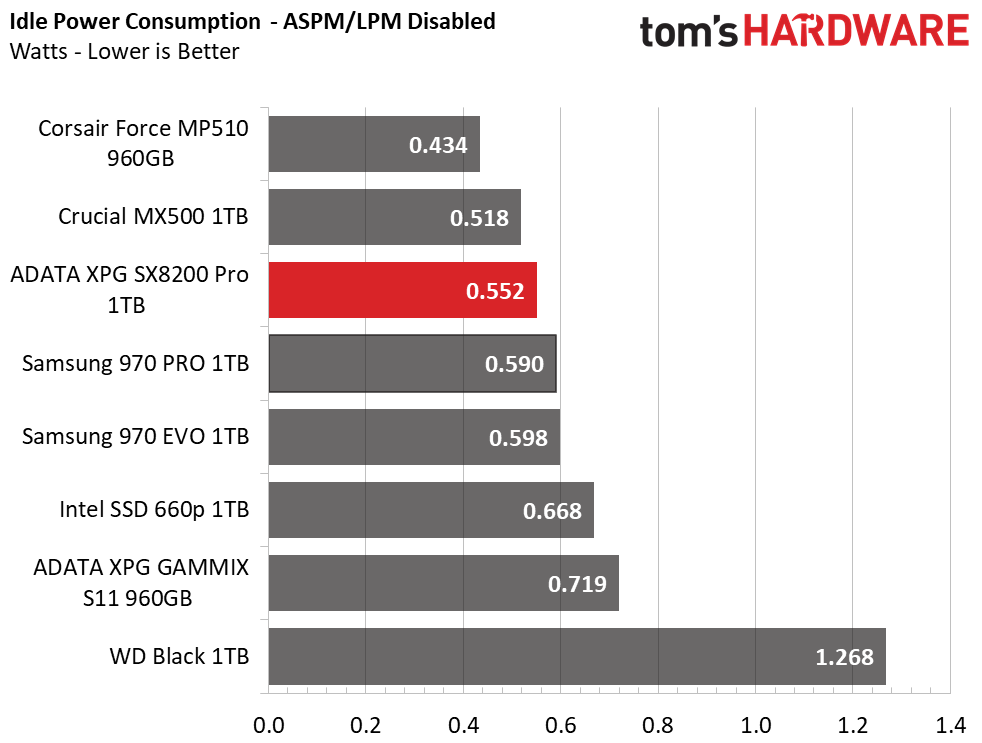
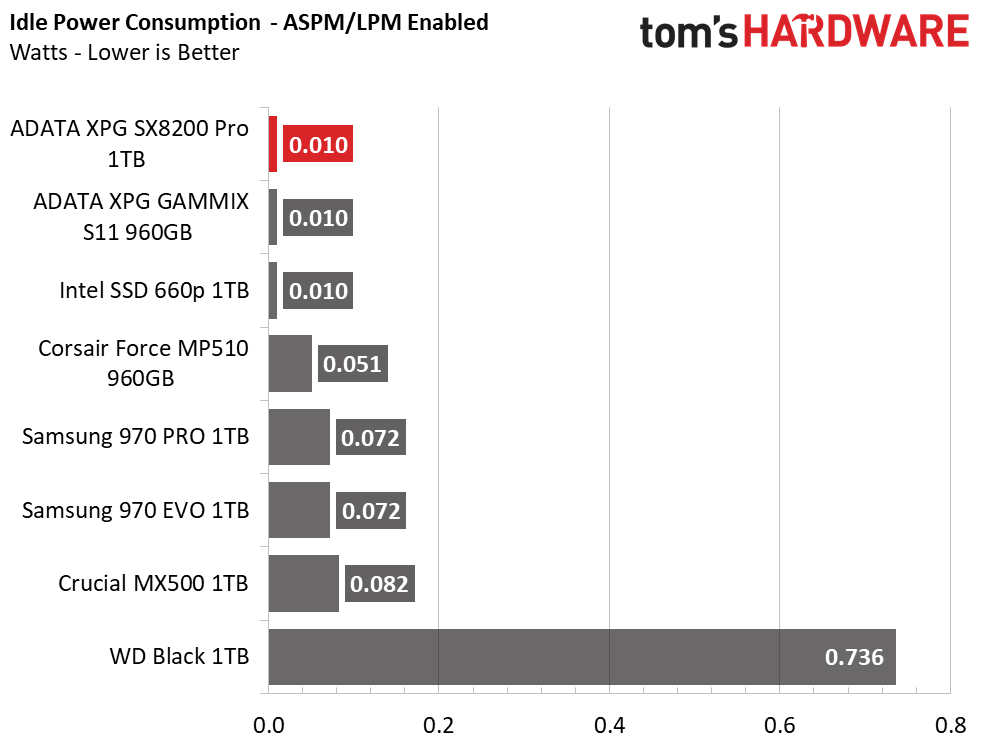
Just as the previous SM2262 featured very low idle power consumption, so does the SM2262EN. The SX8200 Pro sipped just 10mW with ASPM disabled and just over half a watt with the feature disabled.
We recorded maximum power consumption of just 4.05W and an average of just 1.93W during our 50GB file folder transfer. This is even less than the Crucial MX500 and Intel 660P, which are two of the most efficient SSDs on the market. Combined with the 366MB/s average throughput during the transfer test, the SX8200 Pro features class-leading efficiency with an average of 189MB/s per watt. That’s almost 50 percent better than any other SSD in the comparison pool!
MORE: Best SSDs
MORE: How We Test HDDs And SSDs
MORE: All SSD Content
Current page: 1TB Performance Results
Prev Page 512GB Performance Results Next Page 2TB Performance Results
Sean is a Contributing Editor at Tom’s Hardware US, covering storage hardware.
-
popatim Did you run into any issues witht he drive being detected on restarts like several forum users reported?Reply -
Khadijahp Though an limited edition, for comparision purposes the Intel's Ryzen killer Core i9 9900KS should had been included, instead of, or beyond the overclocked 9900K.Reply -
Mezoxin Reply
had the drive for quite a while on my system as my main drive never experienced such issuespopatim said:Did you run into any issues witht he drive being detected on restarts like several forum users reported? -
Mezoxin Reply
yes this is an old review from feburary-april i think , it got somehow reposted , i know this because i read this review before buying minemac_angel said:I thought you did a review of this drive a long time ago. -
Gillerer "Pro" is just a word. You can't draw conclusions from Samsung's use of it to mean "MLC" / "more consistent performance", and apply it to other manufacturers. (You could just as well draw conclusions from AMD's past use of it to mean "partially disabled silicon".)Reply
This simply has an updated controller and firmware compared to the original SX8200, so different - but not necessarily better in all cases - performance characteristics. It's not a different class of product to SX8200 (non-Pro), but rather a later revision that replaces it. -
AlistairAB Replypopatim said:Did you run into any issues witht he drive being detected on restarts like several forum users reported?
Have bought several of these, never had issues showing up in the BIOS. I did have that problem with the Intel equivalent once (the Intel 760p or whatever it was called). Anyways that stuff is motherboard dependent, and has nothing to do with the SSD. -
plotinusredux SM2262EN drives are showing significant slowdowns off the x570 chipset compared to the off the CPU, though we're having trouble getting a response on it. For me (3700x MSI ACE x570 ADATA SX8200PNP) even at Q=1, sequential read is dropping from 2794 MB/s to 2422 MB/s in Crystal. Random read performance is only dropping a little, but random writes are also affected (226 MB/s to 199 MB/s at Q=1, 1451 MB/s to 1041 MB/s at Q=32).Reply
This seems to only be happening with the SM2262EN--see "X570 + SM2262(EN) NVMe Drives" reddit thread where people have tested specifically SM2262EN drives and ones with other controllers in the same system.
If you could test the ADATA and one with another controller on an x570 motherboard, maybe we could get SMI or AMD's attention. -
Zpxkma Anyone else receive one of these ssds with different dram and nand? My first sx8200 pro had micron/nanya and the second one I ordered came with Unic²/Samsung(sec).Reply
a/XujJcFnView: https://imgur.com/a/XujJcFn
